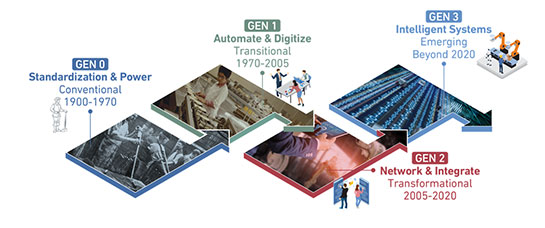October 21, 2019
Manufacturing – one of the most established industries in the modern world of work – has traditionally been the vanguard of technological advances in the workplace. Now, the industry is finding itself more exposed to the effects of tech than ever before. Although digitization isn’t a sector-specific phenomenon, manufacturing continues to experience the greatest impact of it across all job levels. And while the US manufacturing sector has recently been bearing the brunt of ongoing trade wars, the effect of automation is global, long-term and immediate.
Earlier this week, the IMF downgraded forecasts for global GDP growth to 3%, which it blamed in part on a deterioration in manufacturing activity and a slowdown in global trade. But technology represents a huge opportunity to mitigate these headwinds and the potential for manufacturing to transform industries and drive economic growth has never been greater.
Every day, more robots are added to the workforce. Rather than cause for concern, this presents a unique opportunity for human growth, with companies requiring human skills to complement the rise of machines.
Our research shows that over 90% of employers expect to be impacted by digitization in the next two years, with 87% planning to increase or maintain headcount as a result of digitization. Roles are not becoming obsolete, but are instead evolving and ushering in a range of new human focused roles, skills and approaches to support the industry during this era of transformation.
Sector-wide transformation has been turbocharged. The introduction of the Internet of Things, the relentless expansion of data, and the increased use of AI and robotics are creating roles at a rapid rate – with 3.5 million new roles due to be created in the next decade.
At the same time, employers are struggling to find the right blend of technical and soft skills. The pressure doesn’t end there: almost 2.5 million manufacturing workers are due to retire by 2025. 2020 will welcome “Generation Three” of manufacturing, meaning that employees will need to manage highly connected systems. The challenge lies with employers, educators and policymakers to better prepare the future and current workforce with the skills needed to perform these roles.
Until now, what this may look like has been largely undefined. In an effort to address this our latest report, The Future Factory, uncovers the new roles and skills that will fuel the future of our factories.

As we enter the third generation of manufacturing, these challenges are only set to worsen – unless action is taken now.
As the industry transitions to become fully digital, almost half of all roles will need to change. We have identified 165 new manufacturing roles across seven areas of expertise, and the skills employees need to fulfil these roles.
The greatest shift will occur for those working on the shop floor, as they transition into digital manufacturing positions. This group makes up 28% of the new roles, closely followed by those that will manage products, and their data, throughout their lifecycles.
Generation Three will require trailblazing employees to create and introduce new digitally-led ideas and processes. These first-movers – almost one in five employees – will be those who enable other colleagues to adopt and execute these strategies. In manufacturing, this figure will be 60%; from executives, to IT, to the production floor.
Developing leadership skills will be more important than ever when it comes to the future manufacturing sector. We identified 24 new roles where leaders need to be daring in their approach, willing to unleash new talent and accept the possibility of failing fast in order to accelerate success.
Investing in leadership means investing in the entire workforce. Nurturing employees from the bottom up – through upskilling and a culture of continued learning – will create the strongest suite of future leaders. Doing so takes time. Our research shows that it could take one-to-two years to train the skilled manufacturing workforce required for roles of the future, and even longer to train the unskilled population.
Employers from across the globe are struggling to upskill their workforce. Put simply, they need either more money, or more time. Partnerships are crucial to foster effective and continual upskilling. Training has to have impact quicker than ever before.
The return on investment when it comes to upskilling is high. Supporting employees in their preparation for the workforce of tomorrow avoids the high costs of employee turnover, increases retention rates of current employees, leads to better engagement and offers a competitive advantage.
There is no question that automation and AI are impacting the global manufacturing sector and changing the employment landscape. Far from becoming obsolete, these shifts and creating new roles, new skills and new approaches to leadership, opening new doors for employees.
Talent is the most renewable resource on our planet. Investing in the skills and employees that will keep the industry evolving is the best way to prepare for manufacturing Gen Three.

Michael Stull
Michael Stull is Senior Vice President of Manpower, North America. In this role he oversees ManpowerGroup’s staffing business in the United States and Canada. He joined ManpowerGroup in 2010 as Vice President of Global Marketing and expanded his role to include North American Marketing in 2015. Under his leadership, he helped launch the new branding and several strategic innovation initiatives.
Prior to joining ManpowerGroup, Michael developed a broad range of experiences that include strategic, financial, technology and large-scale implementation expertise from organizations including Accenture and a variety of financial institutions.
Michael has a Bachelor of Science in Finance from Miami University and a Master of Business Administration in Finance from Indiana University. He is also very active in his community and currently serves as a member of the Board of Directors for the Marcus Center for the Performing Arts, the Milwaukee Zoological Society, the Milwaukee Area Technical College, and the American Red Cross of Southeast Wisconsin.
Contact info:
www.manpower.us
Danielle Switalski
Danielle.switalski@manpowergroup.com
Scott Ellyson, CEO of East West Manufacturing, brings decades of global manufacturing and supply chain leadership to the conversation. In this episode, he shares practical insights on scaling operations, navigating complexity, and building resilient manufacturing networks in an increasingly connected world.